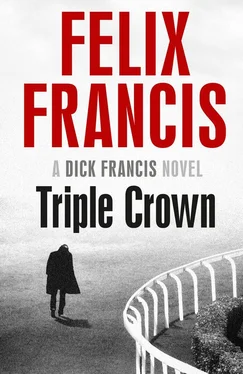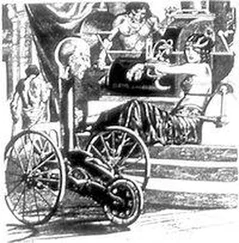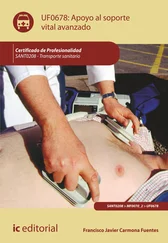Norman Gibson stepped forward to greet him and the two men shook hands.
I, meanwhile, was hovering at the far end of the line, having previously asked Norman to introduce me to the Deputy Director.
Tony walked briefly along, stopping once or twice to talk to the agents. Then he came straight towards where I was standing.
‘Deputy Director,’ Norman said, ‘can I introduce Jeff Hinkley? He’s an international observer from England.’
‘Delighted to meet you,’ I said, shaking Tony’s offered hand.
‘What organisation in England?’ he asked.
‘The British Horseracing Authority.’
‘Then this operation should be up your alley.’
‘So can I come with you?’ I asked.
‘I don’t see why not,’ Tony said. He turned to Norman. ‘What do you think?’
‘Sure. It is only a rehearsal,’ Norman said. ‘No problem.’ He looked down at his watch. ‘OK, everyone, let’s load up.’
Even though there was a fleet of half a dozen black vans available, identical to the one in which Tony had arrived, the transport on this occasion was a military vehicle, identical to the ubiquitous American school bus, but painted dark blue rather than the regular bright yellow.
The three USDA veterinarians were already on board and no one had told them it was a rehearsal — because it wasn’t.
I had recommended to Tony that he should wait as late as possible before informing his special agents about the switch from rehearsal to real thing, so that no one would have the opportunity to make a call or send a warning text. But I hadn’t expected him to leave it as late as he did.
The journey from the Kentucky Air National Guard facility to the backside barns of Churchill Downs was only four miles.
We had turned off I-264, with the iconic twin spires of the grandstand almost visible in the pre-dawn twilight, before Tony stood up at the front of the bus.
‘Listen up, please, ladies and gentlemen.’ He spoke loudly and had the instant attention of all. ‘The operation has been brought forward. This is not a rehearsal. I repeat. This is not a rehearsal. We will arrive at Hayden Ryder’s barn at Churchill Downs in precisely two minutes. I trust you will perform your duties with the usual FACSA expertise and proficiency. Good luck.’
I was trying to watch their faces to see if I could detect any emotion, perhaps a touch of panic that information given to Hayden Ryder in good faith had now been rendered inaccurate.
From the look of his eyes, Norman Gibson was not at all happy. I couldn’t blame him. He was meant to be in charge of this operation but he, too, had been unaware of the switch. There was also some surprise among the others and a couple of murmurs of disapproval, but nothing particularly obvious in the way of panic.
Cliff Connell, sitting right opposite me, simply shrugged his shoulders and removed his Glock 22C from its holster. He checked once again that the magazine was full, and then cocked the weapon by pulling the slide back sharply and releasing it.
He saw me watching him and smiled. ‘Don’t worry,’ he said. ‘The safety’s still on.’
But I did worry, and I was beginning to wish I had a bulletproof vest like the rest of them.
To say that the Churchill Downs raid was different from similar operations I had conducted in the UK would be an understatement.
Only the previous September, I had led a team of three BHA integrity officers to a training stables in Newmarket after an anonymous tip-off that certain horses were being given a concoction of bicarbonate of soda by tube into their stomachs before racing. The process, known as ‘milkshaking’, has the effect of making the blood and muscle less acidic, and hence reducing fatigue.
Milkshaking was a serious breach of the Rules of Racing.
The three of us plus a veterinary technician had appeared unannounced at the stables to carry out a search and to take blood samples for analysis. The trainer in question had been understandably concerned by our arrival but he had assisted us in identifying the correct horses and, all in all, he had cooperated in every way without the need for coercion or threats.
There had been no question of us turning up then in the same manner employed here today by the FACSA agents — before dawn like a posse in a Wild West movie with their guns drawn.
The bus swung in silently through the backside gates, helpfully opened by a Kentucky police deputy, and came to a gentle stop at the designated spot at the end of a line of barns. If I remembered correctly from Steffi’s map, Hayden Ryder’s was the third one down.
‘All set?’ Norman said it in a whisper but each of the agents heard it clearly through their earpieces. ‘Final radio check.’
Again there were eight raised thumbs.
‘OK,’ Norman said, checking his watch. ‘The op is on.’ He withdrew his own weapon from its holster and cocked the mechanism. ‘Get into your positions and wait for my call before going in. Good luck, everyone.’
He started to go down the steps but turned to look straight at me. ‘Jeff, you can use this.’ He tossed me a spare radio. ‘But you wait on the bus with the Deputy Director and the veterinarians. You do not come forward until I tell you to do so. Do you understand?’
I nodded.
The raid team followed Norman off the bus with a mixture of enthusiasm and apprehension showing in their faces. Trudi Harding smiled down at me wanly but her eyes betrayed her anxiety. She was the most nervous. Cliff Connell, meanwhile, was clearly excited and raring to go.
The seven men and two women each knew their starting positions and moved silently towards them. Although it was still before sunrise, there was plenty of light both from the brightening sky in the east and from numerous security lights set high on poles, and I watched through the bus window as the team spread out.
Even though the track wouldn’t be open for another fifteen minutes, there was already much activity in the barns with horses being readied for their morning exercise.
‘I’m going closer,’ I said to Tony.
‘But Norman said you were to wait on the bus.’
I looked at him with my head cocked to one side as if to say, ‘So what?’
I went down the steps and moved slowly past the first barn in the line, stopping close to the second one. Hayden Ryder’s barn was the next one down and appeared quite normal, with several internal lights visible through the open sides.
All was still quiet.
‘Listen up,’ Norman’s whispered voice said in my earpiece. ‘Anyone not in position?’
There was no responding call from the agents.
‘Good. Count down — three, two, one — go!’
The stillness of the dawn was suddenly broken by seemingly all nine armed agents shouting at the same time.
‘Armed federal officer! Stand still with your hands up.’
I watched as Steffi Dean made her way towards the northeastern corner of the barn, her two arms stretched firmly out in front of her, her right hand locked around the grip of her Glock 22C, with her left hand holding her right wrist for added stability.
No silencer, I noted. This was not a covert operation.
Back in the offices in Arlington, she had told me that she’d never fired her gun other than on a range, but now she looked more than ready, moving her whole torso from side to side with her head so that the barrel always pointed directly where she was looking.
As I crept closer, there was more shouting from within the barn and then, quite suddenly, a series of shots rang out — at least ten in rapid succession.
‘Man down! Man down!’ was shouted loudly through my earpiece by a high-pitched female voice.
Oh shit!
Even I knew that ‘Man down’ meant that one of the special agents had been injured, or worse.
Читать дальше












